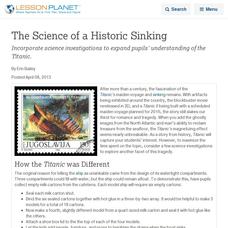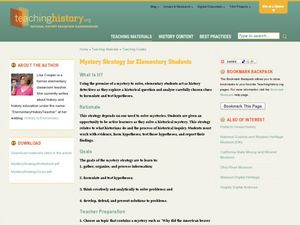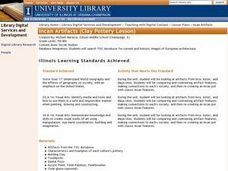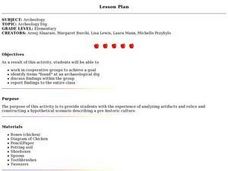Curated OER
Real-Life History: Looking at Our Community
Spend several days with your class exploring local history. Learners brainstorm and categorize sources of historical information as primary or secondary; collect and present artifacts from family/community; construct a definition of...
Smithsonian Institution
Eastern Indian Wars
Many know that Native Americans were forced off their lands and moved west, but how did these people react? The Red Sticks faction of the Creek nation opted to defend themselves and their lands in a series of wars called the Eastern...
Curated OER
The Science of a Historic Sinking
Incorporate science investigations to expand pupils' understanding of the Titanic.
Curated OER
Traces: Historic Archaeology
Students list at least five different kinds of artifacts archaeologists have found in U.S. excavations. They cite artifacts when describing life at a particular archaeological site.
Curated OER
The Grapes of Wrath: Scrapbooks and Artifacts
Students interpret historical evidence presented in primary and secondary sources. In this Great Depression lesson plan, students read John Steinbeck's The Grapes of Wrath and use ethnographic research...
Curated OER
For the Record
Learners read a New York Times article in order to examine the importance of cultural artifacts. They create essays from the point of view of one cultural artifact to demonstrate the knowledge they gained by doing research.
Curated OER
Stone Tools of Texas Indians
Provide background information regarding the use of stone tools from the paleoindian through the late prehistoric periods. Learners can read this informational passage to gain insight on how and why we study these amazing artifacts from...
Curated OER
Mystery Strategy for Elementary Students
Learners of all ages solve historical mysteries. Elementary learners research historical topics by organizing information presented by their instructor, formulating hypotheses, and considering solutions to mysteries presented about...
Curated OER
Writing American Diaries
Young scholars examine the concept of historical perspective in writing. They read the diary of Sally Wister, a young Patriot from Philadelphia during the Revolutionary Era. Additionally, they must include different points of view in...
Curated OER
Mapping the Past
Students study historical maps to view how the world evolved from medieval times through the Renaissance. They work in groups to examine the maps and present a report on one of the listed maps.
Curated OER
Back to Basics
Students examine the unique and diverse historical artifacts that people have designed to fulfill their everyday needs in extraordinary ways. They identify ways humans have used design throughout history to enhance the ways they meet...
Curated OER
Incan Artifacts - Clay Pottery Lesson
Students study Incan artifacts found at an online database and create samples using clay pottery and paint.
PBS
Written in Stone
Students explore history through a tour of a local cemetery. Students investigate tombstones for historical information, make stone rubbings, and use this secondary source reference to obtain primary sources.
Curated OER
Real-Life History
Students collect artifacts which are part of their family/community history. They gather at home and share in the classroom at a specified time when extra care and supervision might be provided.
Curated OER
When Clay speaks
Students listen as the teacher reads "When Clay Sings," by Byrd Taylor. They discuss clay, and view a variety of clay items. Students watch a video clip "Interests in One of a Kind Pots." They watch a demonstration on working with clay....
Curated OER
Archeology Dig
Students look into a bag of artifacts as a group and draw conclusions on what they find. In this archaeology lesson plan, students draw a picture of the settlement represented by these items.
PBS
Conceptualizing an Experiment
Students analyze information from a variety of sources in order to create a hypothesis about the origin of an interesting family artifact. They create alternative hypotheses based upon available information in order to understand that...
PBS
Scavenger Hunt
Learners conduct field research of a historical site in order to discover a more complete understanding of a time period. They visit a site of historical significance and complete a scavenger hunt about the area.
Curated OER
Contextual Clues
Students observe and interpret images of artifacts in different contexts in order to recognize importance of leaving artifacts in original context to correctly understand their meaning, and observe what is surrounding object to interpret...
Curated OER
What did I find?
Students excavate an artifact. In this archaeology lesson, students get a bucket filled with dirt and a broken up artifact. They work in groups to take it out and to find what its purpose was.
Curated OER
The Family: Louisiana Family Folklore
Students explore and identify family treasures and research the history to each one. They also organize a variety of artifacts into various categories and research traditional Louisiana artifacts online. Each student draws inferences...
Curated OER
Sticks, Stones, Sinews and Stuff: How Early People Used the Environment to Meet Basic Needs
Students create an artifact. For this early survival lesson, students use found objects to create an artifact that could have been used to help early people meet their basic needs.
Curated OER
In Celebration of the Silk Road
Sixth graders explore the ancient trade routes of the Silk Road with a focus on a province in China to identify artifacts and research how these items arrived in the city of Turpan.
Society for Science & the Public
Easter Islanders Made Tools, Not War
When studying artifacts, especially tools, how do archaeologists determine what the devices were used for? In what ways might researchers' previous experiences influence their perception of an artifact? An article about researchers'...

























